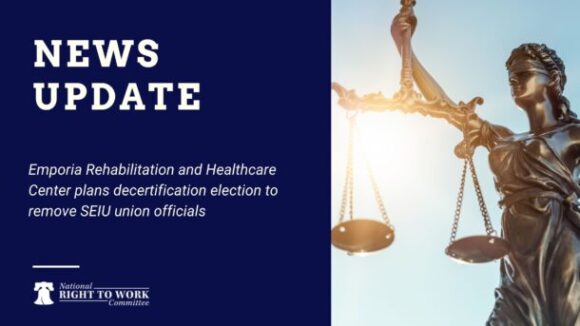Healthcare Workers at HRI Hospital Win Campaign to Remove Unwanted SEIU Union Bosses
SEIU 1199 officials concede defeat after a majority of HRI Hospital employees sign petition backing Federal Labor Board-run decertification election
You could be forgiven for thinking that Big Labor’s primary purpose is politics these days. With the Service Employees International Union (SEIU) well into its plan to spend some $150 million to elect the pet politicians of Big Labor bosses, it is time to ask: “Where’d they get that much money?”
A July 28 editorial by the Wall Street Journal puts it into perspective:
That’s a question the Departments of Labor and Justice are being asked to investigate by the National Right to Work Legal Defense Foundation. Specifically, the labor watchdog group wants Justice to query a new SEIU policy that appears to coerce local workers into funding the parent union’s national political priorities.
The union adopted a new amendment to its constitution at last month’s SEIU convention, requiring that every local contribute an amount equal to $6 per member per year to the union’s national political action committee. This is in addition to regular union dues. Unions that fail to meet the requirement must contribute an amount in “local union funds” equal to the “deficiency,” plus a 50% penalty. According to an SEIU union representative, this has always been policy, but has now simply been formalized.
No other major institution could get away with its bosses demanding that every single one of its workers step in line behind its political preferences. This is the sort of imposed political obeisance that infuriates so many workers and turns them away from unions.
The SEIU political mandate may also violate federal law. Union and corporate PACs are supposed to rely on “voluntary” contributions, and it is illegal for them to use money secured by the “threat” of “financial reprisal.” It’s hard to see that an SEIU mandate enforced by financial penalties of 50% isn’t a “threat” or would qualify under any definition of “voluntary.”
There’s more. As many workers who would rather not join a union realize, employees can be required to join a union or to pay dues as a condition of employment. It is illegal, however, for a union to take these compelled union dues and use them to affect federal elections.
SEIU locals will no doubt try to fulfill their national commitment with voluntary contributions. But the SEIU’s amendment suggests that unions that fail to meet that obligation will be required to pay for both the shortfall and penalty with member dues and agency fees. Any use of that dues money in a PAC would be a federal no-no. Meanwhile, use of dues from nonunion members (those who must pay dues even though they refuse to join a union) for any political activity, a PAC or otherwise, is prohibited. . . .
The Journal got it right:
. . . The SEIU contribution demand isn’t just another technical violation of campaign-finance rules but may break serious rules about labor operations and union dues. The time to investigate this is before the election.
Union employees have every right to participate in elections. Union chiefs don’t have the right to coerce them.
SEIU 1199 officials concede defeat after a majority of HRI Hospital employees sign petition backing Federal Labor Board-run decertification election

Josh Hawley distances himself from pro-Right to Work pledges, aligning with union bosses like the Teamsters, despite their history of corruption.

Emporia Rehabilitation and Healthcare Center plans decertification election to remove “Workers United Mid Atlantic Regional Joint Board” union officials